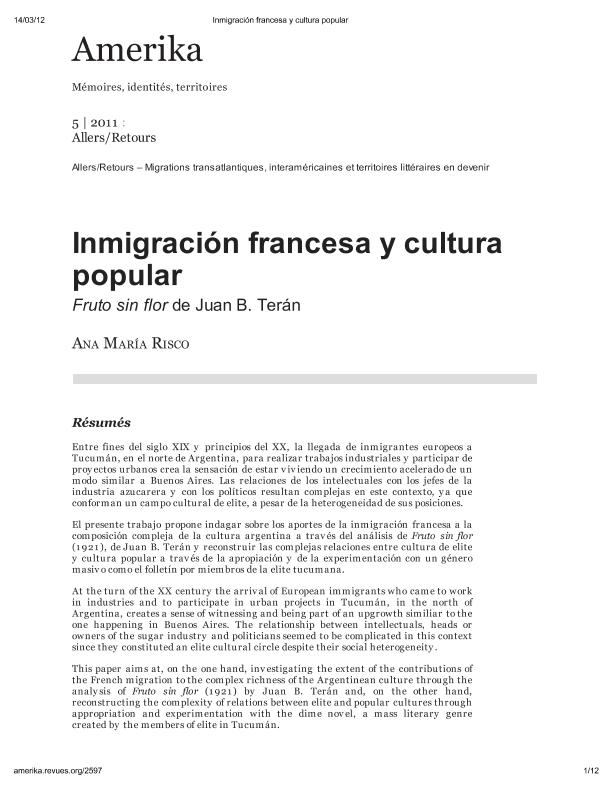Mostrar el registro sencillo del ítem
dc.contributor.author
Risco, Ana Maria

dc.date.available
2019-04-09T18:57:57Z
dc.date.issued
2011-12
dc.identifier.citation
Risco, Ana Maria; Inmigración francesa y cultura popular; Université de Rennes. Laboratoire de Recherches Interdisciplinaires sur les Amériques; Amerika; 5; 12-2011; 1-12
dc.identifier.issn
2107-0806
dc.identifier.uri
http://hdl.handle.net/11336/73588
dc.description.abstract
Entre fines del siglo XIX y principios del XX, la llegada de inmigrantes europeos a Tucumán, en el norte de Argentina, para realizar trabajos industriales y participar de proyectos urbanos crea la sensación de estar viviendo un crecimiento acelerado de un modo similar a Buenos Aires. Las relaciones de los intelectuales con los jefes de la industria azucarera y con los políticos resultan complejas en este contexto, ya que conforman un campo cultural de elite, a pesar de la heterogeneidad de sus posiciones. El presente trabajo propone indagar sobre los aportes de la inmigración francesa a la composición compleja de la cultura argentina a través del análisis de Fruto sin flor (1921), de Juan B. Terán y reconstruir las complejas relaciones entre cultura de elite y cultura popular a través de la apropiación y de la experimentación con un género masivo como el folletín por miembros de la elite tucumana.
dc.description.abstract
At the turn of the XX century the arrival of European immigrants who came to work in industries and to participate in urban projects in Tucumán, in the north of Argentina, creates a sense of witnessing and being part of an upgrowth similiar to the one happening in Buenos Aires. The relationship between intellectuals, heads or owners of the sugar industry and politicians seemed to be complicated in this context since they constituted an elite cultural circle despite their social heterogeneity. This paper aims at, on the one hand, investigating the extent of the contributions of the French migration to the complex richness of the Argentinean culture through the analysis of Fruto sin flor (1921) by Juan B. Terán and, on the other hand, reconstructing the complexity of relations between elite and popular cultures through appropriation and experimentation with the dime novel, a mass literary genre created by the members of elite in Tucumán.
dc.format
application/pdf
dc.language.iso
spa
dc.publisher
Université de Rennes. Laboratoire de Recherches Interdisciplinaires sur les Amériques
dc.rights
info:eu-repo/semantics/openAccess
dc.rights.uri
https://creativecommons.org/licenses/by-nc-sa/2.5/ar/
dc.subject
Inmigración Francesa
dc.subject
Cultura Popular
dc.subject
Folletín
dc.subject
Campo Intelectual
dc.subject
Terán, Juan B.
dc.subject.classification
Estudios Generales del Lenguaje

dc.subject.classification
Lengua y Literatura

dc.subject.classification
HUMANIDADES

dc.title
Inmigración francesa y cultura popular
dc.title
French migration and popular culture
dc.type
info:eu-repo/semantics/article
dc.type
info:ar-repo/semantics/artículo
dc.type
info:eu-repo/semantics/publishedVersion
dc.date.updated
2019-03-08T15:04:56Z
dc.journal.number
5
dc.journal.pagination
1-12
dc.journal.pais
Francia

dc.journal.ciudad
Rennes
dc.description.fil
Fil: Risco, Ana Maria. Consejo Nacional de Investigaciones Científicas y Técnicas. Centro Científico Tecnológico Conicet - Tucumán; Argentina. Universidad Nacional de Tucumán. Facultad de Filosofía y Letras. Instituto Interdisciplinario de Literaturas Argentina Comparada; Argentina
dc.journal.title
Amerika
dc.relation.alternativeid
info:eu-repo/semantics/altIdentifier/url/http://amerika.revues.org/2597
dc.relation.alternativeid
info:eu-repo/semantics/altIdentifier/doi/http://dx.doi.org/10.4000/amerika.2597
Archivos asociados
